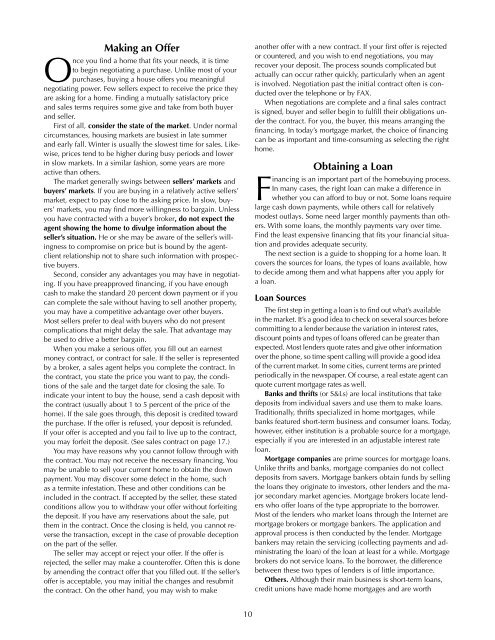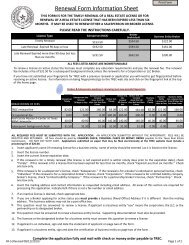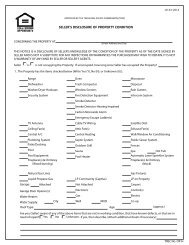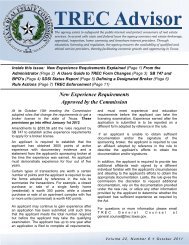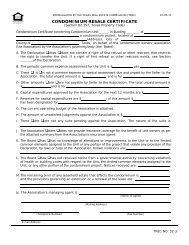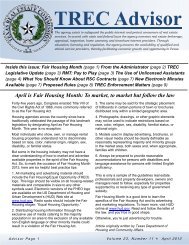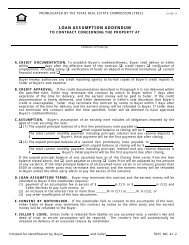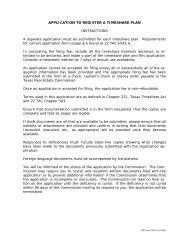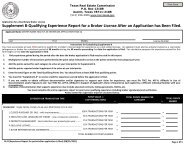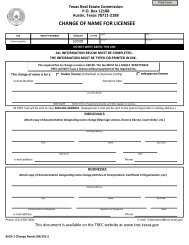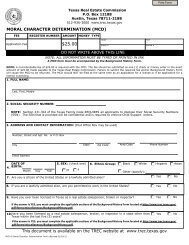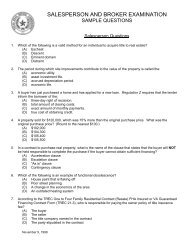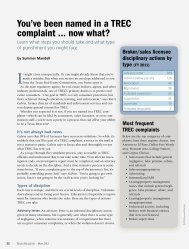Homebuyer's Guide - Real Estate Center - Texas A&M University
Homebuyer's Guide - Real Estate Center - Texas A&M University
Homebuyer's Guide - Real Estate Center - Texas A&M University
You also want an ePaper? Increase the reach of your titles
YUMPU automatically turns print PDFs into web optimized ePapers that Google loves.
Making an Offer<br />
Once you find a home that fits your needs, it is time<br />
to begin negotiating a purchase. Unlike most of your<br />
purchases, buying a house offers you meaningful<br />
negotiating power. Few sellers expect to receive the price they<br />
are asking for a home. Finding a mutually satisfactory price<br />
and sales terms requires some give and take from both buyer<br />
and seller.<br />
First of all, consider the state of the market. Under normal<br />
circumstances, housing markets are busiest in late summer<br />
and early fall. Winter is usually the slowest time for sales. Likewise,<br />
prices tend to be higher during busy periods and lower<br />
in slow markets. In a similar fashion, some years are more<br />
active than others.<br />
The market generally swings between sellers’ markets and<br />
buyers’ markets. If you are buying in a relatively active sellers’<br />
market, expect to pay close to the asking price. In slow, buyers’<br />
markets, you may find more willingness to bargain. Unless<br />
you have contracted with a buyer’s broker, do not expect the<br />
agent showing the home to divulge information about the<br />
seller’s situation. He or she may be aware of the seller’s willingness<br />
to compromise on price but is bound by the agentclient<br />
relationship not to share such information with prospective<br />
buyers.<br />
Second, consider any advantages you may have in negotiating.<br />
If you have preapproved financing, if you have enough<br />
cash to make the standard 20 percent down payment or if you<br />
can complete the sale without having to sell another property,<br />
you may have a competitive advantage over other buyers.<br />
Most sellers prefer to deal with buyers who do not present<br />
complications that might delay the sale. That advantage may<br />
be used to drive a better bargain.<br />
When you make a serious offer, you fill out an earnest<br />
money contract, or contract for sale. If the seller is represented<br />
by a broker, a sales agent helps you complete the contract. In<br />
the contract, you state the price you want to pay, the conditions<br />
of the sale and the target date for closing the sale. To<br />
indicate your intent to buy the house, send a cash deposit with<br />
the contract (usually about 1 to 5 percent of the price of the<br />
home). If the sale goes through, this deposit is credited toward<br />
the purchase. If the offer is refused, your deposit is refunded.<br />
If your offer is accepted and you fail to live up to the contract,<br />
you may forfeit the deposit. (See sales contract on page 17.)<br />
You may have reasons why you cannot follow through with<br />
the contract. You may not receive the necessary financing. You<br />
may be unable to sell your current home to obtain the down<br />
payment. You may discover some defect in the home, such<br />
as a termite infestation. These and other conditions can be<br />
included in the contract. If accepted by the seller, these stated<br />
conditions allow you to withdraw your offer without forfeiting<br />
the deposit. If you have any reservations about the sale, put<br />
them in the contract. Once the closing is held, you cannot reverse<br />
the transaction, except in the case of provable deception<br />
on the part of the seller.<br />
The seller may accept or reject your offer. If the offer is<br />
rejected, the seller may make a counteroffer. Often this is done<br />
by amending the contract offer that you filled out. If the seller’s<br />
offer is acceptable, you may initial the changes and resubmit<br />
the contract. On the other hand, you may wish to make<br />
another offer with a new contract. If your first offer is rejected<br />
or countered, and you wish to end negotiations, you may<br />
recover your deposit. The process sounds complicated but<br />
actually can occur rather quickly, particularly when an agent<br />
is involved. Negotiation past the initial contract often is conducted<br />
over the telephone or by FAX.<br />
When negotiations are complete and a final sales contract<br />
is signed, buyer and seller begin to fulfill their obligations under<br />
the contract. For you, the buyer, this means arranging the<br />
financing. In today’s mortgage market, the choice of financing<br />
can be as important and time-consuming as selecting the right<br />
home.<br />
Obtaining a Loan<br />
Financing is an important part of the homebuying process.<br />
In many cases, the right loan can make a difference in<br />
whether you can afford to buy or not. Some loans require<br />
large cash down payments, while others call for relatively<br />
modest outlays. Some need larger monthly payments than others.<br />
With some loans, the monthly payments vary over time.<br />
Find the least expensive financing that fits your financial situation<br />
and provides adequate security.<br />
The next section is a guide to shopping for a home loan. It<br />
covers the sources for loans, the types of loans available, how<br />
to decide among them and what happens after you apply for<br />
a loan.<br />
Loan Sources<br />
The first step in getting a loan is to find out what’s available<br />
in the market. It’s a good idea to check on several sources before<br />
committing to a lender because the variation in interest rates,<br />
discount points and types of loans offered can be greater than<br />
expected. Most lenders quote rates and give other information<br />
over the phone, so time spent calling will provide a good idea<br />
of the current market. In some cities, current terms are printed<br />
periodically in the newspaper. Of course, a real estate agent can<br />
quote current mortgage rates as well.<br />
Banks and thrifts (or S&Ls) are local institutions that take<br />
deposits from individual savers and use them to make loans.<br />
Traditionally, thrifts specialized in home mortgages, while<br />
banks featured short-term business and consumer loans. Today,<br />
however, either institution is a probable source for a mortgage,<br />
especially if you are interested in an adjustable interest rate<br />
loan.<br />
Mortgage companies are prime sources for mortgage loans.<br />
Unlike thrifts and banks, mortgage companies do not collect<br />
deposits from savers. Mortgage bankers obtain funds by selling<br />
the loans they originate to investors, other lenders and the major<br />
secondary market agencies. Mortgage brokers locate lenders<br />
who offer loans of the type appropriate to the borrower.<br />
Most of the lenders who market loans through the Internet are<br />
mortgage brokers or mortgage bankers. The application and<br />
approval process is then conducted by the lender. Mortgage<br />
bankers may retain the servicing (collecting payments and administrating<br />
the loan) of the loan at least for a while. Mortgage<br />
brokers do not service loans. To the borrower, the difference<br />
between these two types of lenders is of little importance.<br />
Others. Although their main business is short-term loans,<br />
credit unions have made home mortgages and are worth<br />
10


